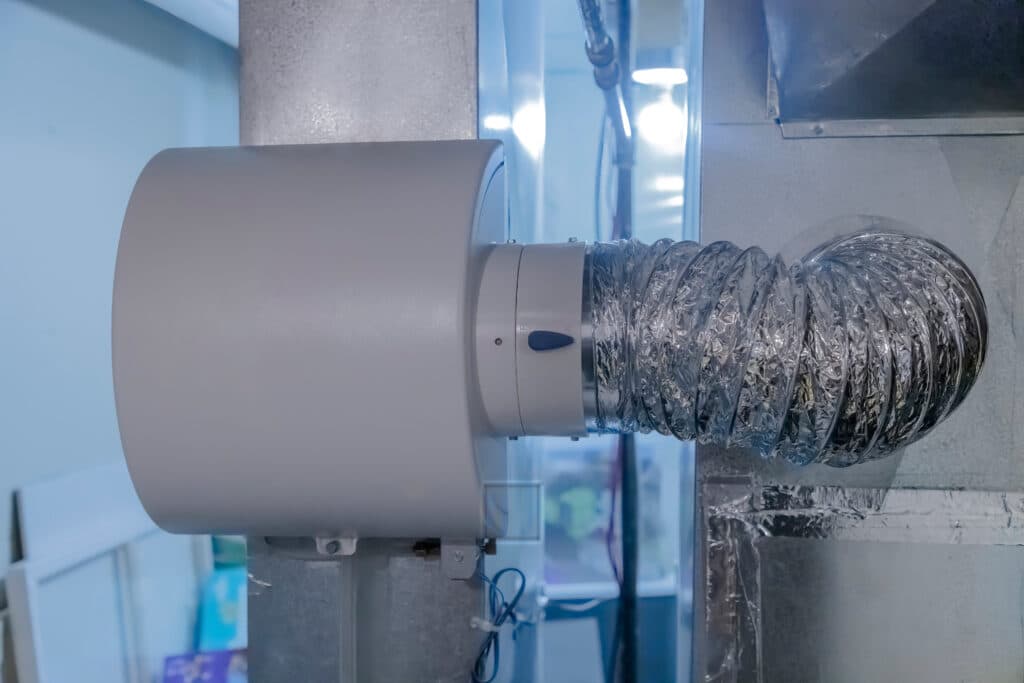
The Role of Humidifiers in HVAC Systems
Do you ever wonder how humidifiers impact your HVAC system? Understanding the role of humidifiers in HVAC systems can transform the comfort and health of your home.
Humidifiers are devices designed to add moisture to the air. They play a crucial role in maintaining optimal humidity levels within your home, contributing to a more comfortable living environment. By releasing water vapor or steam, humidifiers prevent the air from becoming too dry, which is especially beneficial during the colder months when heating systems are running.
Importance of Humidity Control
Why is humidity control so important? Maintaining proper humidity levels is essential for several reasons. It helps preserve the integrity of your home’s structure, prevents health issues related to dry air, and enhances overall comfort. When indoor air is too dry, it can lead to various problems, including dry skin, irritated respiratory passages, and increased susceptibility to colds and flu.
Types of Humidifiers
Understanding the different types of humidifiers can help you choose the best one for your HVAC system. There are four main types:
Ultrasonic Humidifiers
These use ultrasonic vibrations to produce a fine mist. They are quiet and energy-efficient, making them a popular choice for many homeowners.
Evaporative Humidifiers
These work by blowing air through a wet wick or filter. They are simple to use and maintain, and they naturally adjust to the humidity level in the room.
Steam Vaporizers
These heat water to create steam, which is then cooled before being released into the air. They can be used with medicinal inhalants for added benefits.
Central Humidifiers
These are built directly into your HVAC system, providing whole-house humidity control. They are efficient and require less maintenance compared to portable units.
How Humidifiers Work
Humidifiers operate by adding moisture to the air, but the mechanism can vary based on the type. Ultrasonic humidifiers use high-frequency vibrations to create a mist, while evaporative models use a fan to blow air through a moist filter. Steam vaporizers heat water to produce steam, and central humidifiers integrate with HVAC systems to distribute moisture evenly throughout the home.

Benefits of Using Humidifiers in HVAC Systems
Humidifiers provide several advantages when integrated into HVAC systems. These benefits span from improved air quality to enhanced personal comfort, making them a valuable addition to any home.
Improved Air Quality
One of the primary benefits of humidifiers is the improvement of indoor air quality. Proper humidity levels can reduce the presence of airborne particles, such as dust and pollen, creating a cleaner and healthier environment. This is particularly beneficial for individuals with allergies or respiratory conditions.
Health Benefits
Maintaining adequate humidity levels can significantly impact your health. Humidifiers help alleviate symptoms associated with dry air, such as dry skin, irritated eyes, and sore throats. They also prevent the drying out of mucous membranes in the respiratory tract, reducing the likelihood of infections and colds.
Enhanced Comfort
Comfort is another major advantage of using humidifiers in HVAC systems. Humidified air feels warmer than dry air, allowing you to maintain a comfortable temperature without overusing your heating system. This not only enhances comfort but also helps reduce energy bills.
Humidifiers and Energy Efficiency
Humidifiers can contribute to the overall energy efficiency of your HVAC system. By adding moisture to the air, they make it feel warmer, allowing you to lower the thermostat setting. This results in less energy consumption and can lead to significant savings on heating costs over time.
Impact on HVAC Efficiency
A well-maintained humidifier can improve the efficiency of your HVAC system. When the air is properly humidified, the HVAC system doesn’t have to work as hard to maintain a comfortable temperature, reducing wear and tear and extending the lifespan of the equipment.
Energy Savings Potential
The energy savings potential with humidifiers is considerable. By maintaining optimal humidity levels, you can reduce the need for excessive heating, which lowers energy usage and utility bills. Over time, the savings on energy costs can offset the initial investment in a humidifier.
Selecting the Right Humidifier for Your HVAC System
Choosing the right humidifier involves considering several factors, including the size of your home, the features you need, and the maintenance requirements.
Size and Capacity Considerations
Selecting a humidifier with the appropriate capacity for your home is crucial. A unit that is too small won’t effectively humidify your space, while an oversized unit can lead to excess moisture and potential mold issues.
Key Features to Look For
When selecting a humidifier, look for features such as adjustable humidity levels, easy maintenance, and quiet operation. Some advanced models offer smart controls, allowing you to monitor and adjust humidity levels remotely.
Maintenance Requirements
Regular maintenance is essential to keep your humidifier functioning effectively. Consider the ease of cleaning and the availability of replacement filters when choosing a unit. Proper maintenance will ensure optimal performance and longevity.

Installation and Integration with HVAC Systems
Installing and integrating a humidifier with your HVAC system can be a seamless process when done correctly. Proper installation ensures maximum efficiency and effectiveness in maintaining optimal humidity levels in your home.
Steps for Installation
Installing a humidifier involves several key steps. First, you need to select the appropriate location for the unit, typically near the furnace or air handler. Then, connect the humidifier to the HVAC system’s ductwork and water supply. Ensure that the unit is properly wired to the system’s controls to allow for automated operation.
Professional vs. DIY Installation
Deciding between professional and DIY installation depends on your comfort level with HVAC systems. While some homeowners may feel confident in installing a humidifier themselves, professional installation guarantees that the unit is correctly integrated and functioning optimally. Professionals can also provide valuable advice on selecting the right model and maintaining the system.
Maintaining Your Humidifier
Regular maintenance of your humidifier is crucial for its longevity and effectiveness. Proper care ensures that the unit operates efficiently and maintains optimal humidity levels in your home.
Regular Cleaning Practices
Cleaning your humidifier regularly prevents the buildup of mold, bacteria, and mineral deposits. Depending on the type of humidifier, you may need to clean the water tank, filter, and internal components. Use a mixture of water and vinegar for a thorough cleaning, and rinse all parts thoroughly before reassembling.
Filter Replacement
Filters in humidifiers need to be replaced periodically to maintain efficiency. Check the manufacturer’s recommendations for filter replacement intervals. Regularly replacing filters prevents clogs and ensures that the humidifier continues to function effectively.
Troubleshooting Common Issues
Even with proper maintenance, humidifiers can encounter issues. Common problems include reduced mist output, unusual noises, and leaks. Troubleshoot these issues by checking for clogs, ensuring all parts are properly assembled, and verifying that the water supply is sufficient. If problems persist, consult the user manual or contact a professional for assistance.
Health Benefits of Proper Humidity Levels
Maintaining proper humidity levels in your home offers numerous health benefits, making a humidifier a valuable addition to your HVAC system.
Prevention of Dry Skin and Respiratory Issues
Dry air can lead to a range of health issues, including dry skin, chapped lips, and irritated respiratory passages. By maintaining adequate humidity levels, humidifiers help prevent these problems, keeping your skin hydrated and your respiratory system functioning smoothly.
Benefits for Allergy and Asthma Sufferers
Humidifiers can provide relief for individuals with allergies and asthma. Proper humidity levels reduce the presence of allergens such as dust mites and mold, which thrive in dry conditions. This creates a healthier living environment and can alleviate symptoms for allergy and asthma sufferers.
Impact on Sleep Quality
Maintaining optimal humidity levels can significantly improve sleep quality. Humidified air prevents the drying out of nasal passages and throat, reducing snoring and ensuring a more comfortable night’s sleep. This is particularly beneficial during the winter months when heating systems can dry out the air in your home.
Installation and Integration with HVAC Systems
Installing and integrating a humidifier with your HVAC system can be a seamless process when done correctly. Proper installation ensures maximum efficiency and effectiveness in maintaining optimal humidity levels in your home.
Steps for Installation
Installing a humidifier involves several key steps. First, you need to select the appropriate location for the unit, typically near the furnace or air handler. Then, connect the humidifier to the HVAC system’s ductwork and water supply. Ensure that the unit is properly wired to the system’s controls to allow for automated operation.
Professional vs. DIY Installation
Deciding between professional and DIY installation depends on your comfort level with HVAC systems. While some homeowners may feel confident in installing a humidifier themselves, professional installation guarantees that the unit is correctly integrated and functioning optimally. Professionals can also provide valuable advice on selecting the right model and maintaining the system.
Maintaining Your Humidifier
Regular maintenance of your humidifier is crucial for its longevity and effectiveness. Proper care ensures that the unit operates efficiently and maintains optimal humidity levels in your home.
Regular Cleaning Practices
Cleaning your humidifier regularly prevents the buildup of mold, bacteria, and mineral deposits. Depending on the type of humidifier, you may need to clean the water tank, filter, and internal components. Use a mixture of water and vinegar for a thorough cleaning, and rinse all parts thoroughly before reassembling.
Filter Replacement
Filters in humidifiers need to be replaced periodically to maintain efficiency. Check the manufacturer’s recommendations for filter replacement intervals. Regularly replacing filters prevents clogs and ensures that the humidifier continues to function effectively.
Troubleshooting Common Issues
Even with proper maintenance, humidifiers can encounter issues. Common problems include reduced mist output, unusual noises, and leaks. Troubleshoot these issues by checking for clogs, ensuring all parts are properly assembled, and verifying that the water supply is sufficient. If problems persist, consult the user manual or contact a professional for assistance.
Health Benefits of Proper Humidity Levels
Maintaining proper humidity levels in your home offers numerous health benefits, making a humidifier a valuable addition to your HVAC system.
Prevention of Dry Skin and Respiratory Issues
Dry air can lead to a range of health issues, including dry skin, chapped lips, and irritated respiratory passages. By maintaining adequate humidity levels, humidifiers help prevent these problems, keeping your skin hydrated and your respiratory system functioning smoothly.
Benefits for Allergy and Asthma Sufferers
Humidifiers can provide relief for individuals with allergies and asthma. Proper humidity levels reduce the presence of allergens such as dust mites and mold, which thrive in dry conditions. This creates a healthier living environment and can alleviate symptoms for allergy and asthma sufferers.
Impact on Sleep Quality
Maintaining optimal humidity levels can significantly improve sleep quality. Humidified air prevents the drying out of nasal passages and throat, reducing snoring and ensuring a more comfortable night’s sleep. This is particularly beneficial during the winter months when heating systems can dry out the air in your home.
Humidifiers in Different Climates
Using humidifiers effectively depends on your climate and seasonal changes. Different climates require unique approaches to maintain optimal humidity levels throughout the year.
Best Practices for Various Climates
In dry climates, such as deserts or high-altitude areas, humidifiers are essential year-round. They combat the low humidity that can lead to health issues and discomfort. In humid climates, you might only need a humidifier during the winter when indoor heating reduces moisture levels. Understanding your local climate will help you use your humidifier effectively.
Seasonal Adjustments
Seasonal changes can greatly impact indoor humidity levels. During winter, heating systems can dry out the air, making humidifiers crucial. In summer, especially in humid regions, you might need to switch off or reduce the use of humidifiers to prevent excess moisture. Adjusting your humidifier settings seasonally ensures that you maintain optimal humidity levels year-round.
Cost Considerations
When investing in a humidifier, consider both the initial cost and long-term savings. While the upfront cost can vary, the benefits often outweigh the investment over time.
Initial Investment vs. Long-Term Savings
The initial cost of a humidifier includes the unit itself and installation fees. High-quality humidifiers might seem expensive, but they can save money in the long run by improving HVAC efficiency and reducing energy bills. Over time, these savings can offset the initial investment.
Comparing Different Models and Brands
Different humidifier models and brands offer various features and price points. When selecting a humidifier, consider factors such as capacity, ease of maintenance, and additional features like smart controls. Comparing these aspects can help you find a model that fits your needs and budget.
Humidifiers and Mold Prevention
Proper humidity control is vital for preventing mold growth. Mold can cause serious health issues and damage your home, making it essential to maintain the right humidity levels.
Importance of Proper Humidity Control
Maintaining humidity levels between 30-50% is ideal for preventing mold growth. Too much moisture can create a breeding ground for mold, while too little can cause dryness and discomfort. Using a humidifier helps achieve the right balance, protecting your home and health.
Tips to Prevent Mold Growth
To prevent mold growth, regularly clean your humidifier and replace filters as needed. Use a hygrometer to monitor indoor humidity levels and adjust your humidifier settings accordingly. Ensure proper ventilation in your home, especially in areas prone to moisture, such as bathrooms and basements.
Environmental Impact of Humidifiers
Humidifiers can have varying impacts on the environment, depending on their energy consumption and design. Opting for eco-friendly models can minimize your environmental footprint.
Energy Consumption
The energy consumption of humidifiers varies by type and model. Ultrasonic and evaporative humidifiers are generally more energy-efficient compared to steam vaporizers. Choosing an energy-efficient model can reduce your electricity usage and environmental impact.
Eco-Friendly Options
Some humidifiers are designed with eco-friendly features, such as energy-saving modes and recyclable materials. When selecting a humidifier, consider these options to make a more environmentally conscious choice. Additionally, proper maintenance can extend the life of your humidifier, reducing waste.
Case Study: Humidifiers in Plano, TX
Humidifiers play a crucial role in addressing the unique climate challenges in Plano, TX. Local residents have experienced significant benefits from using humidifiers in their homes.
Specific Climate Challenges
Plano, TX, experiences hot summers and mild winters, leading to fluctuating indoor humidity levels. During the summer, air conditioning can dry out indoor air, while winter heating can further reduce moisture. Humidifiers help maintain comfortable and healthy humidity levels throughout the year.
Local Installation Examples
Many homeowners in Plano have successfully integrated humidifiers into their HVAC systems. These installations have improved indoor air quality, enhanced comfort, and reduced health issues associated with dry air. Local HVAC professionals provide expert installation and maintenance services to ensure optimal performance.
Testimonials from Residents
Residents of Plano, TX, have shared positive experiences with using humidifiers. They report improved sleep quality, fewer respiratory issues, and enhanced overall comfort. These testimonials highlight the significant benefits of maintaining proper humidity levels in homes.
FAQs
-
How often should I clean my humidifier?
Clean your humidifier at least once a week to prevent mold and bacteria buildup. Follow the manufacturer’s instructions for specific cleaning guidelines.
-
Can a humidifier help with allergies?
Yes, maintaining proper humidity levels can reduce airborne allergens and prevent the drying out of nasal passages, providing relief for allergy sufferers.
-
What is the ideal humidity level for a home?
The ideal indoor humidity level is between 30-50%. Use a hygrometer to monitor and adjust your humidifier settings to maintain this range.
-
How do I choose the right size humidifier for my HVAC system?
Consider the size of your home and the humidifier’s capacity. A unit that’s too small won’t effectively humidify your space, while an oversized unit can cause excess moisture issues. Consult with a professional for the best fit.
-
Are there any eco-friendly humidifier options?
Yes, many modern humidifiers come with energy-saving features, recyclable materials, and low water consumption. Look for models labeled as eco-friendly to minimize environmental impact.






